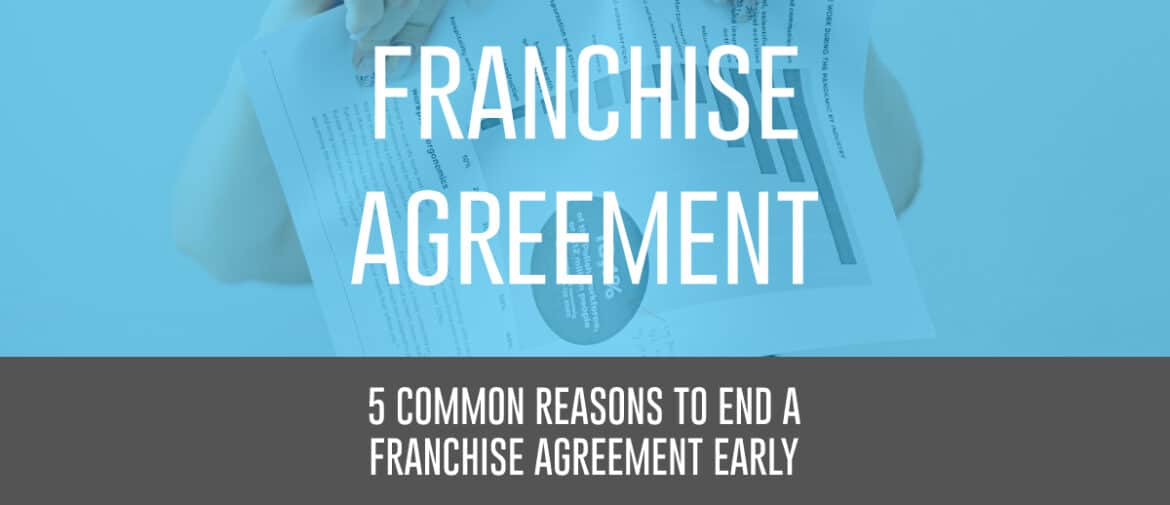A franchisor and franchisee relationship is defined in the Franchise Agreement, which also outlines the length of the partnership, the regulations both have to follow and a contingency to end/terminate the agreement.
However, due to certain circumstances, either party may want to terminate the Franchise agreement prematurely.
There are several factors that may influence either party's decision and certain routes they can consider to move forward with the termination process.
Reasons to Terminate the Agreement
The usual steps involved in the termination of a Franchise Agreement are the suspension of the agreement , and subsequently the termination of the contract, if a compromise or resolution between the two parties does not occur.
Both parties may want to end the partnership at any time and need a reasonable argument to pursue this avenue.
These are the 5 most common reasons to end a Franchise Agreement:
1. Breach or Violation of Agreed Conduct
The franchise agreement states the basic standards of ethics and conduct that the franchisee must abide by. In a situation where there is proven negligence of these standards, the contract can be terminated immediately.
2. Failure to Meet Overdue Fee Obligations
The franchise agreement outlines the various payment obligations that the franchisee must fulfill. In a situation where the franchisee fails to pay the outstanding payments, the contract may be called to be terminated.
3. Failure to Comply with Brand Strategy and Policies
The franchise agreement specifically outlines the framework within which the units have to operate including day-to-day functioning of the unit or expansion/development branding strategies.
If the franchisee does not comply with these policies, despite warnings and reminders, then there is a reasonable cause to end the contract.
4. Franchisor Malpractice
The Franchisor has contractual obligations when it comes to conduct and management. Some common forms of malpractice are:
The franchisor withholding information from investors
An exploitation of profits by the parent company
An inadequate investment in training and development of the local staff
Inadequate support for marketing the brand in general
5. Sustained Losses
According to market research, many franchises can operate in a break-even or a loss position. There are also franchise systems that are untested or unproven and lack adequate means to support franchisees and maintain the promise of business success.
In these situations, a franchisee who is losing a significant amount of money from the operation may be justified to want to get out of the franchise agreement.
How to Approach the Termination of the Agreement
Franchise agreements commonly have a term length, at the end of which the investor can either renew the lease or cease the partnership.
If called to be terminated early, these are some avenues the individual investor can pursue:
1. Cooperate with the Franchisor to reach a mutually benefitting agreement
In certain scenarios, the franchisor can reach a mutual understanding with the parent organization to cease operations.
Typically, the franchise agreement also includes the lease agreement for the property. The ownership of this agreement may be a point of contention between the two parties as each would like to retain the right to own the location for future projects or investments. In such scenarios, it is best to consult a franchising and licensing lawyer who can provide you with the proper guidance to make an informed decision.2. Transferring of Ownership Rights to a 3rd Party
Once a termination agreement has been reached, another agent can be considered for either sale or transfer of the ownership rights of the franchise. The franchise agreement normally includes a transfer fee, franchisor approval right and other conditions on the sale of your business.
Under the right circumstances, however, finding another interested agent can be an easier alternative mechanism for exiting the franchise model. Before signing, due diligence must be done to ensure that the agent understands and is willing to comply with the pre-set regulations and standards.
3. Sale of the franchise back to the Parent Company
Selling the business back to the franchise can be a good idea, but the sale would happen at a discounted price to what was paid for. Therefore, the franchisee is most likely to suffer a loss when pursuing this option.
Once the termination agreement is ratified and due process has been completed, the former franchisee agent should immediately cease using the trademarks and products of the franchise system.
They are also obligated to pay all outstanding amounts owed to the franchisor. Additionally, the former franchisee would have to return all training manuals and other brand related documents to ensure no trade secrets can be exposed.,
Most franchise agreements today also have a non-compete clause in the franchise agreement to deter the individual from creating a competitive brand, especially after being exposed to their system and its market strategy and functioning.
Conclusion
Whether it’s a dispute of interests or a breach of contract/unfaithful conduct, there are valid reasons to pursue the termination of a franchise agreement early.
However, it is critical to seek legal counsel to help you explore all possible avenues for resolution between the franchisee and franchisor before deciding to end the business relationship.
If you have any questions regarding franchising, please call us at (778) 565-4700, and one of our business lawyers will help guide you in the right direction.
The preceding content is for informational purposes only and does not constitute legal or professional advice. To obtain such advice, please contact our offices directly.
Last updated on July 17th, 2023 at 09:03 am

